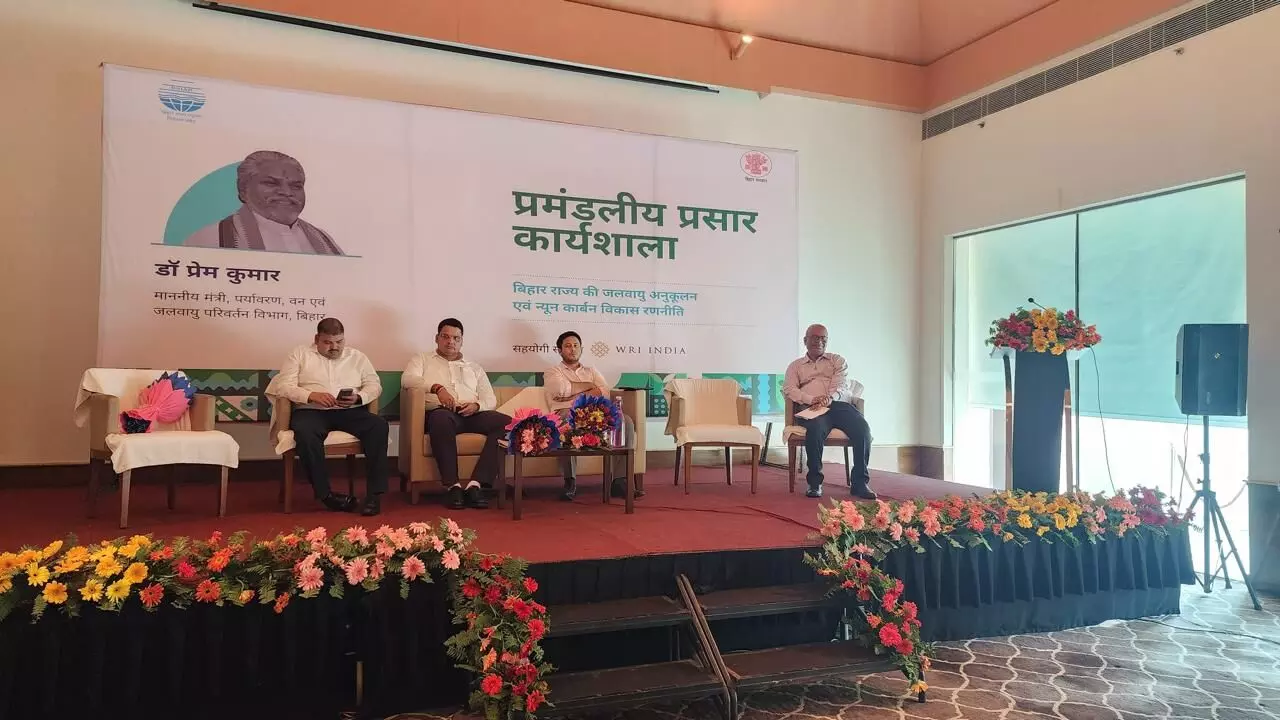Bihar Launches Climate Adaptation and Low Carbon Emission Strategy Workshop in Gaya

A divisional level dissemination workshop was organized in Gaya on Saturday under the Capacity Development Program related to implementation of 'Bihar State's Climate Adaptation and Low Carbon Emission Development Strategy' towards making a carbon neutral state.
The program was inaugurated by Dr. Prem Kumar, Hon'ble Minister, Department of Environment, Forest and Climate Change, Bihar. He gave his presidential address through online medium, in which he emphasized the importance of implementing this strategy by taking the effects of climate change seriously and called it an important step for the coming generations. Therefore, working on this 'Bihar State's Climate Adaptation and Low Carbon Emission Development Strategy' for Bihar is a commendable step towards preserving our climate for the coming generations.
In his welcome address, Regional Officer, Bihar State Pollution Control Board, Gaya, Shri Manoranjan Kumar Singh gave a brief introduction of the workshop and highlighted Bihar's vulnerability to the effects of climate change. He said that 'Climate Adaptation and Low Carbon Emission Development Strategy' is very essential to address the challenges posed by climate change in Bihar.
In a special address, Member Secretary, Bihar State Pollution Control Board, Shri Neeraj Narayan said that in pursuance of the resolution of the Government of India, Bihar has resolved to make the state carbon neutral by 2070. This target can be achieved by coordinated efforts between various departments of the State Government such as Energy, Agriculture, Transport and Water Resources Department along with other stakeholders. Climate Adaptation and Low Carbon Emission Development Strategy has been in the works for the last 2.5 years, under which more than 250 stakeholder consultation meetings were held, which resulted in the formulation of this strategy.
Gaya Municipal Commissioner, Mr. Kumar Anurag, in his inaugural address said that it is important to adopt climate adaptation strategies to face natural disasters like floods and droughts in Bihar, so that the economic and environmental prosperity of the state can be safeguarded. Bihar has taken active steps for climate action, including the 'Bihar State Climate Adaptation and Low Carbon Emission Development Strategy'. This report talks about the steps to be taken for climate adaptability and adaptation.
In his address, Mr. Naveen Kumar, Senior Scientist, Bihar State Pollution Control Board said that climate change is a global concern. Recognizing the urgency of the issue, the Government of Bihar and UNEP signed a Memorandum of Understanding (MoU) for climate-resilient and low-carbon development pathways in February 2021. A report on this project was released in March this year.
Detailed information about the workshop was given by Dr. Shashidhar Kumar, Senior Program Manager, WRI India. He said that currently the state of Bihar emits carbon equivalent to about 9.7 crore tons of carbon dioxide, which is about 3% of India's total emissions. In the coming years, carbon emissions may increase even more due to the increasing pace of development in the state, but by adopting the net zero strategy, carbon emissions can be reduced comparatively, as a result of which the ill effects of climate change can also be reduced.
Dr. Shashidhar said in his statement that the temperature in Bihar has increased by 0.8 degrees Celsius in the last 50 years and the temperature is estimated to increase by 0.8-1.3 degrees Celsius by 2030, 1.4-1.7 degrees Celsius by 2050 and 1.8-2.5 degrees Celsius by 2070. Apart from this, the onset of monsoon is getting delayed now. Explaining about the climate change adaptation measures, he mentioned diversification in crop and farming systems, integrated management of surface and groundwater, protection, conservation and regeneration of forest ecosystems, encouragement of private sector and protection and enhancement of livelihoods in times of disaster.
During the workshop, Shri Gaurav, Zonal Manager, J WIRES, discussed the regional aspects in detail. He emphasized the importance of renewable energy (RE), livelihood enhancement and promotion for rural women. Along with this, he highlighted the importance of energy efficient cooking system, Jeevika Energy Efficient Cooking System, to improve lifestyle. He said that these measures will not only lead to economic empowerment in rural communities, but will also ensure environmental sustainability, which will strengthen the climate adaptation efforts of Bihar.
Officials of various departments and other stakeholders present in the program also shared their views. At the end of the workshop, Mrs. Tony Kumari, SDC, Gaya thanked everyone.
